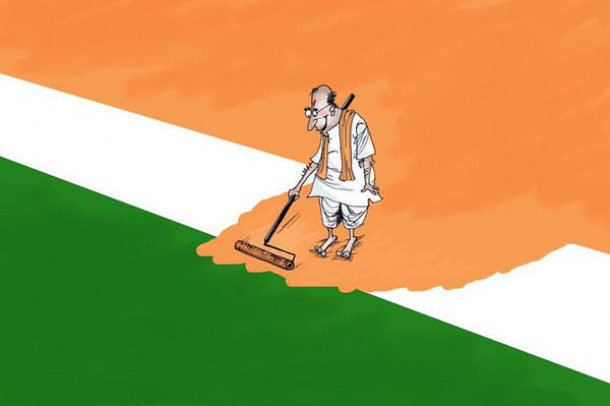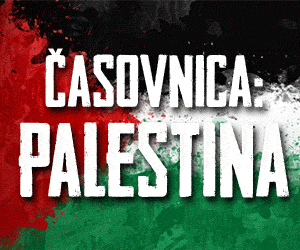HINDUTVA V AKCIJI
Skupina progresivnih študentov na Univerzi Jawaharlala Nehruja v indijskem glavnem mestu New Delhi je 9. februarja pripravila protest ob obletnici usmrtitve kašmirskega poslovneža Afzala Guruja. Vodstvo univerze je tik pred zborovanjem pod pritiskom nacionalističnih študentskih skupin preklicalo dovoljenje za protest. Kljub prepovedi so organizatorji protest izpeljali, istočasno pa so nacionalistične študentske skupine, ki so protestnike obtožile protidržavnega delovanja, organizirale protiprotest. Nekaj dni kasneje je notranji minister Rajnath Singh oznanil, da protidržavne aktivnosti ne bodo tolerirane, oblasti pa so aretirale voditelje protesta zaradi nagovarjanja k uporu.
Afzal Guru, čigar smrt je bila povod za omenjeni protest, je bil kašmirski poslovnež, usmrčen leta 2013 zaradi domnevnega sodelovanja v napadu na indijski parlament leta 2001. A njegova obsodba je temeljila le na posrednih dokazih in celo indijsko ustavno sodišče je v sodbi priznalo, da neposrednih dokazov ni, vendar bo zaradi narave zločina “kolektivna zavest družbe zadoščena le s smrtno kaznijo”. Guru tako med kašmirci in progresivnimi deli indijske družbe velja za žrtev vesti, medtem ko ga nacionalistične politične in družbene sile brezpogojno označujejo za terorista in protidržavnega akterja. Spor glede primera Afzala Guruja pa ni spor okoli dokaznih standardov ali smrtne kazni, temveč del vedno bolj zaostrenega ideološkega konflikta med progresivnim in kvaziprogresivnim delom družbe na eni strani ter nacionalističnim in hindujsko supremacističnim delom, ki je v Indiji trenutno na oblasti.
Študentska skupina Akhil Bharatiya Vidyarthi Parishad, krajše ABVP, ki je sprožila protiproteste, je študentsko krilo organizacije Rashtrija Swayamsevak Sangh, krajše RSS. RSS, s 5 do 6 milijoni članov največja nevladna organizacija na svetu, je hindujska supremacistična organizacija, vodena s strani pripadnikov najvišje kaste, ki Indijo želijo vrniti v domnevno zlato dobo hindujske kastne ureditve antične Indije. V svoji ideologiji in delovanju se zgleduje po evropskih fašističnih gibanjih, kar v indijskem kontekstu pomeni zatiranje muslimanov, kristjanov, komunistov in staroselcev. To opiše Nitasha Kaul, profesorica na Westminster University:
It was founded in the 1920’s and many of it founder members, if you read the documents, or their books, they make it quite clear that it is a Hindu supremacy organization which wants to transform the idea of India into pure Hindu nation. And, it’s well recognized that one of their former members Nathuram Godse assassinated Mahatma Gandhi. They have also their stands on various issues during riots and other times has been very problematic they have sought to consciously pursue a Hindu supremacist agenda and their main aim is essentially to identify India as a Hindu nation and to create this idea of Hindu self. And the Other to that is anybody who does not belong or does not seek to live with the good will of the Hindu self. It's a majoritarian, Hindu supremacist organization that has been involved in a lot of violent incidents, such as the demolition of Babri Masjid mosque which was a turning point for communal forces in the country. They have a whole range of other subsidiary organizations that target specific demographics, such as the youth, the students, the farmers, the small business sector, et cetera. So they have a whole range of cultural, social, youth and other wings or affiliated organizations and they aim essentially is to create this culturally pure idea of a Hindu nation.
Študentsko gibanje ABVP, ki je sprožilo konflikt glede protestov na Univerzi Jawaharlala Nehruja je torej le eden izmed členov v RSS-ovi mreži. Politično krilo RSS-ja pa je stranka Bharatiya Janata Party, ki od leta 2014 vodi zvezno vlado. Njen predsednik in trenutni premier Narendra Modi je dolgoletni član RSS-ja in bivši premier zvezne države Gujarat, v kateri je pod njegovim vodstvom prišlo do množičnih pogromov nad muslimani. Zaradi vpletenosti v te pogrome so bili obsojeni nekateri izmed njegovih najtesnejših sodelavcev, medtem ko njegova vloga nikoli ni bila razčiščena.
Zmaga BJP-ja na volitvah pred dvema letoma je ideologom RSS-ja na široko odprla vrata v indijsko politiko, v kateri so začeli zaostrovati ideološke in komunalistične konflikte. (V indijskem kontekstu beseda komunalizem označuje ideologijo ograjevanja posameznih verskih in etničnih skupnosti ter bolj ali manj agresivno nastopanje proti ostalim delom družbe.) Del teh konfliktov so tudi dogodki, ki se jim bomo posvetili v naslednjih minutah in že prej omenjeni študentski protesti. BJP je sicer indijsko vlado vodila že v letih 1999 do 2004 pod vodstvom Atala Biharija Vajpayeeja. A kot pojasni Prem Kumar Vijayan, profesor na Delhi University, v takratni konstelaciji BJP sama ni imela večine in je bila prisiljena v koalicijo, ki je omilila strankine hindujsko supremacistične tendence, medtem ko ima v trenutnem spodnjem domu parlamenta BJP absolutno večino:
Vajpayee was a head of a coalition government in which BJP was just a partner - a major partner, but they didn't have the seats to be a full-fledged government. And therefore they needed someone like Vajpayee who would manage the coalition partners who had stipulated very clearly that they would go along with the BJP but provided that certain aspects of the BJP ideology never came to the fore, including issues of anti minority behaviour. The National democratic alliance - the NDA - government of the time played a very strong role in tampering the BJP, ensuring that the BJP is not entirely under the RSS control. Today that is not the case.
Osvobojen koalicijskih omejitev je RSS ojačal svoj vpliv na politiko stranke. Izmed petih generalnih sekretarjev stranke so bili trije v BJP imenovani neposredno s strani RSS-ja, eden izmed njih je bil do imenovanja celo član izvršnega organa RSS. Na vodilni mesti v izpostavah v dveh ključnih zveznih državah sta bila prav tako imenovana vidna člana RSS-ja. Kadrovanje pa se ne ustavi v stranki, temveč se nadaljuje tudi v državnih organih. Na vodilna mesta v kulturnih in izobraževalnih institucijah, kot so Nacionalni svet za zgodovinske raziskave, Svet za kulturne odnose, Nacionalna agencija za knjigo ter Komisija za film so bili imenovani posamezniki s tesnimi povezavami z RSS-jem in v nekaterih primerih z zelo vprašljivimi kvalifikacijami. Kot pove Nandini Sundar iz Delhi University, gre pri imenovanjih za ljudi, ki bodo zgodovino in kulturo razlagali skozi revizionistično hindujsko supremacistično prizmo:
The kind of history they are promoting is also one that tries to erase the contribution of different communities, erase the contribution of different periods of history, especially the medieval India, which is the period when the Mongols were the dominant empire in North India. And they want to have a history which in focused only on Ancient India when according to them there was a glorious age of Hindu upper caste, Vedic civilisation. So the kinds of people that they have appointed to various institutions like the Indian council for historical research, or The national book trust or other organisations are the kind of people who will concentrate on the greatness of a Hindu civilisations at the expense of every other culture and in this country we have something like 4000 different communities who have different customs, different languages, many different ways of dressing and eating and they want to destroy this diversity in favour of a single upper caste Hindu homogenous identity.
Potvarjanje zgodovine je za sile hindujskega nacionalizma, imenovanega tudi hindutva, ključnega pomena. Temelj njihove ideologije, torej glorifikacija zlate dobe antične hindujske civilizacije, namreč, tako kot pri podobnih fašističnih gibanjih drugod po svetu, ne temelji na zgodovinskih dejstvih, temveč na mitu. Ker je tradicionalna barva hinduizma žafranska, se je revizionističnega gibanja prejelo ime žafranizacija. BJP se je tako v institucijah, ki jih nadzira, kot v zveznih državah, kjer je na oblasti, zato lotila tudi izobraževalnega sistema. Spremembe, ki jih na tem področju uvaja, vključujejo na primer obvezno izvajanje joge, ki dobiva vedno močnejšo politično konotacijo, pa tudi spremembe v učnih načrtih. Opiše Vijayan:
The first thing we have to understand that this government is paying a lot of attention to school textbooks and school curriculum. So what we found happening in the last few years since the Modi government took over is an acceleration of curriculum content dealing or being derived from Hindu sources. It can be something as simple as enforced Yoga classes. Which are clearly just a kind of veneer cover for Hindu exercises, you know, Hindu rituals being practised. Or it can go as far as rewriting the textbooks wheater it goes for history textbook or social science textbooks or it can be an actual interference in kinds of disciplines, for example, it was unthinkable to have astrology as a discipline at the University, but today we have astrology! It is actually thought as a course! And it’s not … If it was kind of anthropological study how astrology has emerged in different countries or something like that one could understand it. But this is Vedic astrology, how to actually read palms and how to read the future by looking at the stars. This is thought in Delhi University. And these are some of the changes of great magnitude that are coming in our country.
V zvezni državi Gujarat, ki jo je sedanji indijski premier Narendra Modi vodil med leti 2001 in 2014, so na primer kot dodatno čtivo na nižjih stopnjah izobraževanja uradno predpisali knjige, v katerih se poleg očitnega hindujskega supremacizma pojavljajo tudi trditve, da je hindujska civilizacija že pred 5.000 leti izumila letenje, televizijo in plastično kirurgijo, pri dokazovanju teh trditev pa se opirajo na izvirno interpretacijo verskih besedil. Šolam, ki jih vodi RSS in v katerih so tovrstni učbeniki obvezno čtivo, so v nekaterih zveznih državah odobrili tudi državna sredstva. Spremne besede za te knjige ni napisal nihče drug kot trenutni premier Narendra Modi. Avtor omenjenih domislic pa je Dinanath Batra, dolgoletni aktivist RSS-ja, trenutno pa predsedujoči RSS-jevi izobraževalni skupini, ki, sicer neuradno, svetuje izobraževalnemu ministrstvu glede reforme šolstva.
Nadaljnji poskus utrjevanja hindujsko supremacistične mentalitete je kampanja ghar wapsi - to je RSS-jeva kampanja spreobračanja pripadnikov drugih ver v hinduizem. Pri tem ne gre toliko za poskus spremembe demografskih razmerij kot za simbolni in politični akt. Že v samem imenu kampanje je implicitno vključena predpostavka, da le hindujci lahko pripadajo indijskemu narodu. Opiše Kaul:
It’s a symbolic campaign the idea that they’ve had and some of these reconversions, so basically the conversions back to Hinduism which are called Ghar Wapsi they’ve had these mass reconversions at various points in the last hundred years. But the idea of these Ghar Wapsi campaign is to project – Ghar means home and Wapsi means return – so the idea is that those, who are undertaking this reconversion are actually coming back home and essence is also symbolically implying that they are not back home so they have chosen to leave home. So it has a symbolic value it is not really ment to change the demographics, it’s more important to again and again reconfirm the Hindu identity It’s not the demographic change it’s the symbolic proliferation of this notion.
Poleg simbolnega utrjevanja hindujske identitete pa ima kampanja tudi neposreden političen cilj. Predstavlja obliko pritiska, s katero njeni ideologi po lastnih besedah skušajo doseči sprejem zakona, ki bo na zvezni ravni urejal spreobrnitve. Namen takšne ureditve bi bil oteževanje spreobračanja v druge religije, na pa tudi v hinduizem, kakršna je že praksa v več zveznih državah. Opiše Sundar:
For instance, if you convert to Christianity, you have to – in states like Madhya Pradesh or Odisha – you have to report it to the district administration which is supposed to ensure that no force or fraud is use. So the RSS narrative is that the Christians are converting people out of by offering them loans, by offering them money so that is why they are becoming Christians. And the requirement that they register is to prevent these fraudulent conversions. So already we have these laws in these different states, which have actually been there for a long time. Many of them were brought in even during Congress governments because the pressure from the right-wing of the Congress and BJP and its affiliates or the RSS and its affiliates. So the problem is that conversion to Christianity or Islam is seen as criminal, whereas conversion to Hinduism is simply not even recognised as conversion and therefore does not fall within the the ambit of this act.
Če je v enih zveznih državah spreobrnitev v hinduizem izvzeta iz ureditve, pa v drugih ohlapna ubeseditev aktualni oblasti pušča precej odprte roke pri odločitvah, katere spreobrnitve so prostovoljne in katere ne, ter s tem oteževanje nezaželjenih zamenjav veroizpovedi in dovoljevanje zaželjenih. Tovrstno ureditev na zvezni ravni zagovarja tudi BJP, vendar trenutno za takšno potezo nima dovolj glasov v zgornjem domu parlamenta, ki ga sestavljajo predstavniki zveznih držav.
Odkrito diskriminatorne so tudi spremembe zakonodaje, ki ureja zakol, prodajo in posedovanje govedine. Določene omejitve na tem področju pozna večina indijskih zveznih držav. V dveh državah pod vodstvom BJP-ja so v zadnjem letu zakonodajo zaostrili in prepovedali ne le zakol, temveč tudi prodajo govedine v kakršnikoli obliki in izvoz goveda z namenom zakola. Nitasha Kaul opiše problematičnost takšne zakonodaje:
It’s basically not just even beef it’s the political use of vegetarianism and on the issue of beef, of course there is this, it’s the cultural marker and that is the way in which Muslims can be harassed on the suspicion of possessing of beef or transporting the cattle. In addition to which there is also the issue, there is a case dynamics to this, so the idea of vegetarianism is tight very much to an upper caste hierarchical notion of Hinduism. You know in majority of India beef is one of the cheapest sources of protein for people. So it’s a basically conscious cultural ideological attempt to create a marker basically who is a pure good Hindu self and how the others need be punished for transgressing those norms. This issue of the beef ban now it’s not even just a fact that they banned beef, which is, you know, first of all, it’s an issue because constitutionally that wasn’t the case. By banning the slaughter of cows they also have created the atmosphere of vigilantism where people, especially Muslim minorities are targeted on the suspicion of having consumed beef. So last year there was this case, so there were cases of the lynchings, there is one particular case which made international, the case of Mohamed Akhlaq, where he was lynched to death by the mob on the suspicion of possessing beef. So it gives, it creates this kind of intolerant atmosphere where people can be targeted by self-style vigilantes acting in the interest of pure Hindus on the suspicion of possessing beef or transporting cattle intended for slaughter. It creates this whole political climate of intimidation.
Takšna klima zastrahovanja in nasilnih incidentov, ki slej kot prej izhajajo iz nje, supremacističnim silam RSS-ja ustreza. Ustreza pa tudi specifično njenemu strankarskemu delu, torej stranki BJP. Kot pojasni Nitasha Kaul, obstaja povezava med tovrstnim nasiljem in njihovim volilnim uspehom:
This link, that some scholars have explored, between riots and the gain in electoral advantage. I quote this Yale university political science study, which were of riots in India, which suggests that Hindu-Muslim riots are electorally costly for the congress, but riots in the year prior to the election, result in an increased vote share for the ethno-religious parties, like the BJP. So by communalizing the situation they do have, I think there is also a common-sensical element to it that as the majoritarian communalist party, if there is a greater communalisation, than clearly they have the demographic advantage.
Zaostrovanje komunalistične delitve kot volilna taktika ne ustreza le ideološkim interesom hindutva ideologov, temveč tudi njihovim kapitalskim ozadjem. Indijska korporativna elita je Modijevo volilno kampanjo podprla s 670 milijoni dolarjev. A hitri liberalizaciji, ki jo zahtevajo sile kapitala, se velik in zaenkrat močan del družbe upira. To se je najočitneje pokazalo ob predlogu zemljiškega zakona, s katerim bi olajšali postopke za odvzem zemlje kmetom z namenom razvoja industrije. Modi je bil označen za nasprotnika kmetov, kar je v Indiji nevzdržna politična pozicija, in sprejem zakona opustil. Poglabljanje komunalističnih konfliktov tako predstavlja prikladen vzvod za šibitev progresivne opozicije. Komentira Vijayan:
One of the biggest paradoxes for the right-wing in India is that they claim to be nationalist economically as well. In the sense that they want to have an economic policy on national level, which is protectionist, which protects the trader and the farmer and the labourer and so forth. But they can’t do that, they can’t do that because their leadership is entirely backed by the big business. So increasingly brazen privatisation - this is going on. Employment is going down, impoverishment is going up, the gap between rich and poor in India today is of a magnitude that is unprecedented. The farmers suicides, perhaps you may have heard of, are escalating in number, precisely because farmers are unable to pay back loans they took. So today if the beef ban is being hyped up, if people are being attacked in communal violence, if the protest in Jawaharlal Nehru University is about secularism and about freedom of speech and so on, all this is a distraction from the changes that are gradually but consistently taking place in political and economical level.
Če komunalistični konflikti predstavljajo prikladno distrakcijo od ekonomske realnosti, pa je levica tista, ki razvoj ekonomske realnosti v smeri interesov kapitala dejansko ovira. Njena sekularna tradicija pa hkrati preprečuje razvoj komunalističnih sil. Kot taka predstavlja logično naslednjo tarčo hindutva-kapitalske naveze in v tem kontekstu gre razumeti konflikt med študentskimi skupinami na Univerzi Jawaharlala Nehruja. Zaključi Vijayan:
So three primary enemies of Hindu nationalism, or Hindutva, are in that order, Muslims, Christians, and communists. Now, that is important, because throughout this period since 1925 we’ve seen them attacking Muslims. They have been attacking Christians since the first right-wing government that BJP led NDA government that came into power in 1998. And immediately they have started attacking Christians at that point. And since than there has been a continous series of attacks on the Christian communities across India but particularly in notrh India for last, I mean, right since 1998, so 18 years. But now the latest development is that they have started targeting the communists, or whom they see as communists. Jawaharlal Nehru University protest going on in a student community here, and so on. That is essentially an anti-leftist move on a part of the right wing.























Prikaži Komentarje
Komentiraj